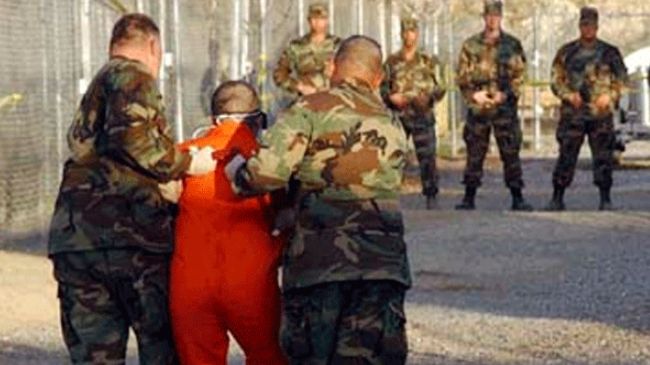

Washington: The Pentagon said late on Monday that it is studying the cost of moving inmates from Guantanamo to military jails in South Carolina and Kansas, as the White House seeks to close the controversial facility.
President Barack Obama made shuttering the Cuba-based prison a priority when he took office in 2009, but Congress has opposed measures to transfer detainees to the US mainland.
The White House is currently putting finishing touches on a new plan to close Guantanamo, which will be presented to lawmakers for review.
The military prisons in focus are at Fort Leavenworth in Kansas and the Naval Brig in Charleston, South Carolina.
“We did have a team last week that visited Fort Leavenworth to conduct some very preliminary cost assessment for what it would cost to put detainees there,” said Pentagon spokesman Captain Jeff Davis. The team will be in Charleston next week, Davis said, adding it is also expected to visit some non-Department of Defence sites.
Guantanamo opened in January 2002 on the heels of the September 11, 2001 attacks on New York’s World Trade Center and on the Pentagon in Washington. After reaching a peak of 680 war on terror detainees in 2003, there are 116 detainees remaining.
The White House had intended to provide lawmakers with a new road map for shuttering the facility before lawmakers went on their August recess.
As part of the plan, the administration had earlier considered sending some of the 116 detainees remaining at the prison to either a top-security prison in Illinois or a naval facility in Charleston.
But during a recent video teleconference among top administration officials, Scott Ferber, senior counsel to the deputy attorney general, said the Justice Department could not support the use of the federal prison in Thomson, Illinois, according to the officials, who, like others, spoke on the condition of anonymity to discuss internal deliberations.
Ferber said the Justice Department had made a public commitment in 2012 when it purchased the facility from the state of Illinois that it would not relocate detainees to Thomson. Former Attorney General Eric H Holder Jr told the Senate Judiciary Committee: “We will not move people from Guantanamo, regardless of the state of the law, to Thomson. That is my pledge as attorney general.” Holder’s commitment, made during sworn testimony, was apparently overlooked by officials when the most recent plan was drawn up.
Thomson is no longer being considered, and the White House is again looking at other federal facilities, officials said.
“Funding for Thomson prison was approved based on the understanding that no detainees from Guantanamo would be held there, and therefore, Thomson is not part of those discussions,” a senior administration official said.
The last-minute dispute is another sign of the many difficulties plaguing the White House attempt to make good on Obama’s promise to close the military detention facility before he leaves office in 2017.
Even if officials can settle on a site, the prospect of bringing any detainees to the US mainland — either for prosecution in military commissions or indefinite detention without trial under the laws of war — remains radioactive for many in Congress.
Lawmakers have argued that no place in the United States can offer the same security as Guantanamo. The administration has countered that the Bureau of Prisons holds many dangerous terrorists who were convicted in federal court.
For months, administration officials have been racing to assemble a plan that could win support in the Senate, where Senator John McCain (Arizona), the Republican chairman of the Armed Services Committee, has voiced tentative support for closing the facility — if he receives a detailed proposal for how the administration would mitigate security risks in doing so.
“We want to continue to work with Sen McCain and members of Congress to safely and responsibly close the facility,” said Myles B Caggins III, a White House spokesman.
But since Obama first announced his goal of shutting Guantanamo in 2009, the White House has faced unrelenting opposition in Congress to trying or holding prisoners on the US mainland. Current US law prohibits the administration from spending money to move detainees to the United States.
Under a bill being considered in Congress, lawmakers could vote on the closure plan, and if approved, it would lift restrictions on bringing prisoners to the United States.
Officials don’t know exactly how many prisoners would need to be brought here, but this “irreducible minimum,” as the White House calls the number, is believed to be in the dozens.
It is not the first time that plans to house prisoners at Thomson have created controversy. The 1,600-cell prison currently only holds 79 prisoners, according to the Bureau of Prisons. Justice Department officials said they were surprised to learn that Thomson was being considered.
Another site that officials have been discussing is the Consolidated Naval Brig in Charleston, where terrorism suspects have been held in the past. That location also faces senatorial objections.
Ten detainees are facing military commission charges, less than a tenth of the current population. At the same time, the administration has struggled to clear a backlog of 52 detainees waiting to be transferred home or to third countries. By law, each transfer must be approved by the defence secretary, who in turn is required to provide assurances to Congress that security risks associated with releasing prisoners will be mitigated.
Afp/wp-bloomberg




